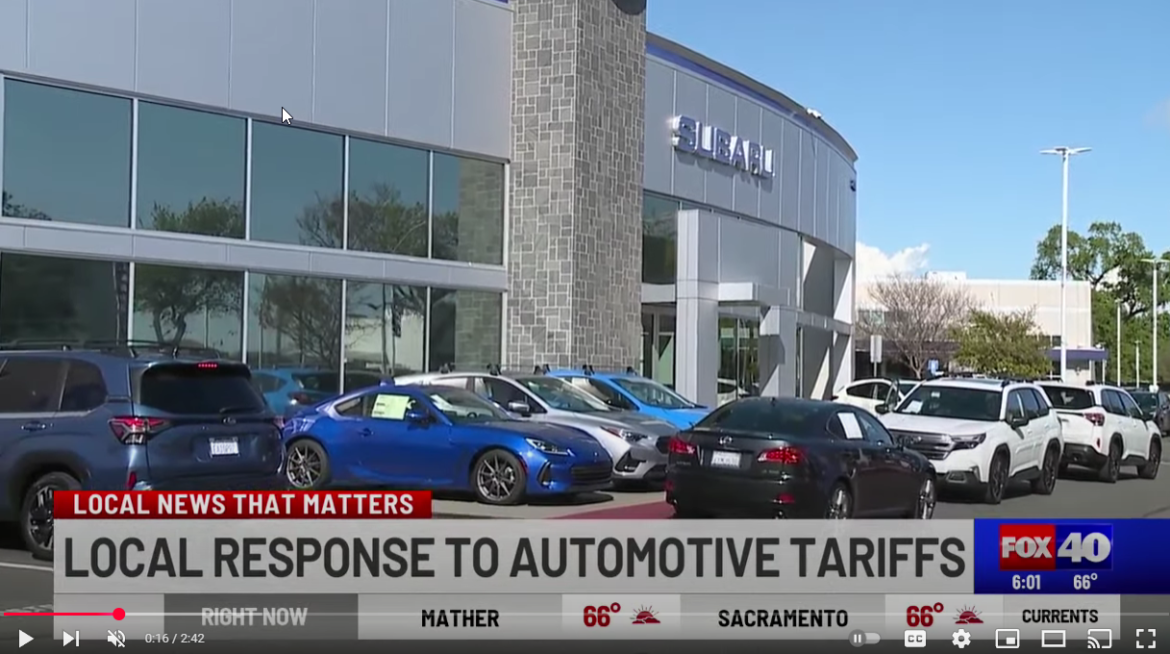As the clock ticks past 12:01 a.m. PDT on Monday, April 7, 2025, a new wave of tariffs on imported vehicles officially takes effect, prompting automobile expert Nick Miles of the YouTube channel Test Miles to issue a clarion call to car buyers: now is the time to purchase a new or used vehicle. Speaking from Portland, Oregon, Miles emphasizes that vehicles currently on dealership lots remain untouched by the 25% tariffs imposed by the Trump administration, offering a fleeting window of opportunity for consumers to avoid impending price hikes. With U.S. Customs and Border Protection still scrambling to implement the new levies, Miles predicts a delay in tariff enforcement, making pre-tariff inventory a bargain for savvy buyers amidst a market bracing for upheaval.
Miles, a seasoned automotive journalist with over a decade of experience, underscores the urgency in a video released today on Test Miles. “The cars on the lots right now have no tariffs attached to them—they’re tariff-free,” he explains, noting that any vehicle entering the U.S. after the midnight deadline faces the new duties. However, he cautions that the tariff structure is far from straightforward. “It’s not as simple as one item or product being taxed at 25%,” Miles says, pointing to the complexity of automotive supply chains where parts often cross borders multiple times. The tariffs, which also extend to auto parts starting May 3, apply to vehicles assembled outside the U.S., with partial exemptions for cars from Canada and Mexico under the USMCA, taxing only non-U.S. components. This nuanced application means price impacts will vary widely across models, with estimates ranging from $3,000 to $12,000 per vehicle, according to industry analysts like the Anderson Economic Group.
The backdrop to this tariff rollout is a policy shift that began taking shape in February 2025, when President Trump first signaled a 25% duty on imported automobiles, a move he formalized on March 26 with an executive order. Dubbed “Liberation Day” by Trump, the April 2 announcement of a 10% baseline tariff on all countries—coupled with the 25% auto-specific levies—aims to bolster U.S. manufacturing by incentivizing domestic production. “We’re going to charge countries for doing business in our country and taking our jobs,” Trump declares in a Rose Garden speech last week, framing the tariffs as a rebirth of American industry. Yet, the auto sector, which has operated under integrated North American supply chains since NAFTA’s 1994 inception, now faces disruption. Cars assembled in the U.S., like the Mercedes-Benz models in Alabama with 90% imported parts, will also see costs rise, as will repairs due to pricier imported components.
Miles highlights a silver lining for consumers: dealerships nationwide are rolling out pre-tariff sales to clear existing inventory. “Many dealerships are offering discounts on cars already on the lots that aren’t subject to tariffs,” he notes, citing a surge in sales reported by automakers like Ford (up 19% in March) and Hyundai (up 13%). This rush mirrors a broader trend, with Cox Automotive estimating March sales at 1.59 million units—the highest in four years—as buyers flock to beat the price hikes. However, Miles warns against panic buying, echoing Consumer Reports’ Jake Fisher, who advises, “It never pays to rush out and make a rash decision you might regret.” Instead, Miles urges buyers to act strategically, leveraging current inventory while it lasts.
The historical context of U.S. auto trade reveals a long-standing reliance on global supply chains. The 1965 Canada-U.S. Automotive Products Agreement and NAFTA fostered a borderless manufacturing ecosystem, with 10.2 million cars made in U.S. factories last year containing 25-60% imported parts. Trump’s tariffs dismantle this framework, aiming to reverse a $1.2 trillion goods trade deficit but risking a $60 billion cost to the auto industry, per AlixPartners. Posts on X reflect consumer anxiety, with some warning of a $15,000 price jump on a $45,000 car, while others, like @stevethinks612, cite a Detroit Free Press report predicting a 700,000-unit sales drop in 2025, potentially costing jobs rather than creating them.
Breaking news adds urgency to Miles’ advice. At 1:15 p.m. PDT today, NBC News reports that Volkswagen is holding vehicles at U.S. ports, awaiting clarity on tariff application, while Hyundai dealers confirm price hikes on post-April 2 shipments. The New York Times notes a ripple effect: used car prices are climbing as demand shifts, with Cox Automotive reporting a 30-day supply of used cars under $15,000—12 days below the overall average. Insurance premiums are also expected to rise as repair costs balloon, a concern for lower-income buyers already squeezed by new car prices averaging $48,641, per Kelley Blue Book.
The broader agricultural sector, as seen in recent cattle rancher support for Trump’s tariffs, contrasts with auto industry fears. While ranchers celebrate protection from foreign beef, automakers like Ford warn of a “hole in the U.S. industry we’ve never seen,” with CEO Jim Farley predicting long-term production halts. Some experts, like S&P Global Mobility’s Peter Nagle, estimate price increases could hit within weeks, though Miles counters that Customs’ lack of a mechanism to apply tariffs buys consumers time. “It’ll be a while before dealerships are charged,” he assures, urging buyers to act before summer, when Cox Automotive forecasts a market slowdown as pre-tariff inventory dwindles.
For now, Miles’ message resonates with consumers like Debbie Boyd, a 74-year-old from Mar Vista, California, who tells the Los Angeles Times she’s racing to replace her totaled Chevy Volt before prices spike. As the auto market navigates uncharted territory, Miles’ advice offers a roadmap: buy now, but buy smart. With tariffs poised to reshape the industry, the window to dodge the storm is closing fast.
Sources:
- Video: https://youtu.be/8eb620b2-4a46-4882-804b-33bc0c0fb96c (Nick Miles on Test Miles discussing tariffs and car buying)
- Web sources: consumerreports.org, abcnews.go.com, nytimes.com, cnn.com, npr.org, cars.usnews.com, caredge.com, coxautoinc.com, cars.com, foxbusiness.com, cbsnews.com, reuters.com, usatoday.com, nbcnews.com, latimes.com
- Posts on X reflecting consumer sentiment and market reactions
- General knowledge of U.S. auto trade history and tariff policies



